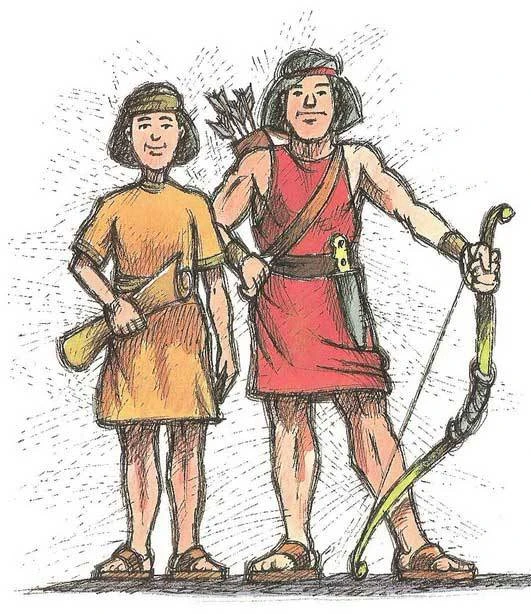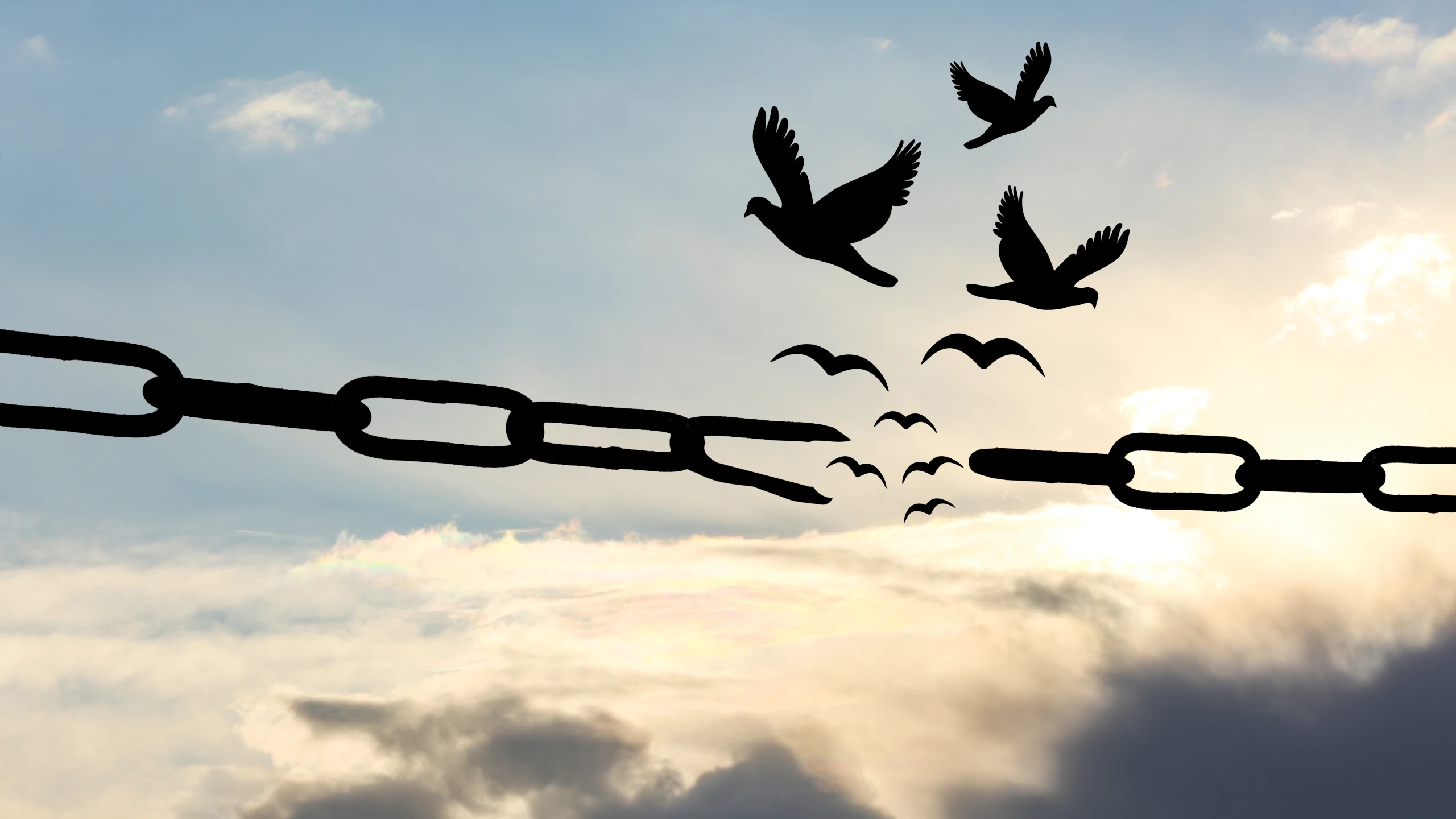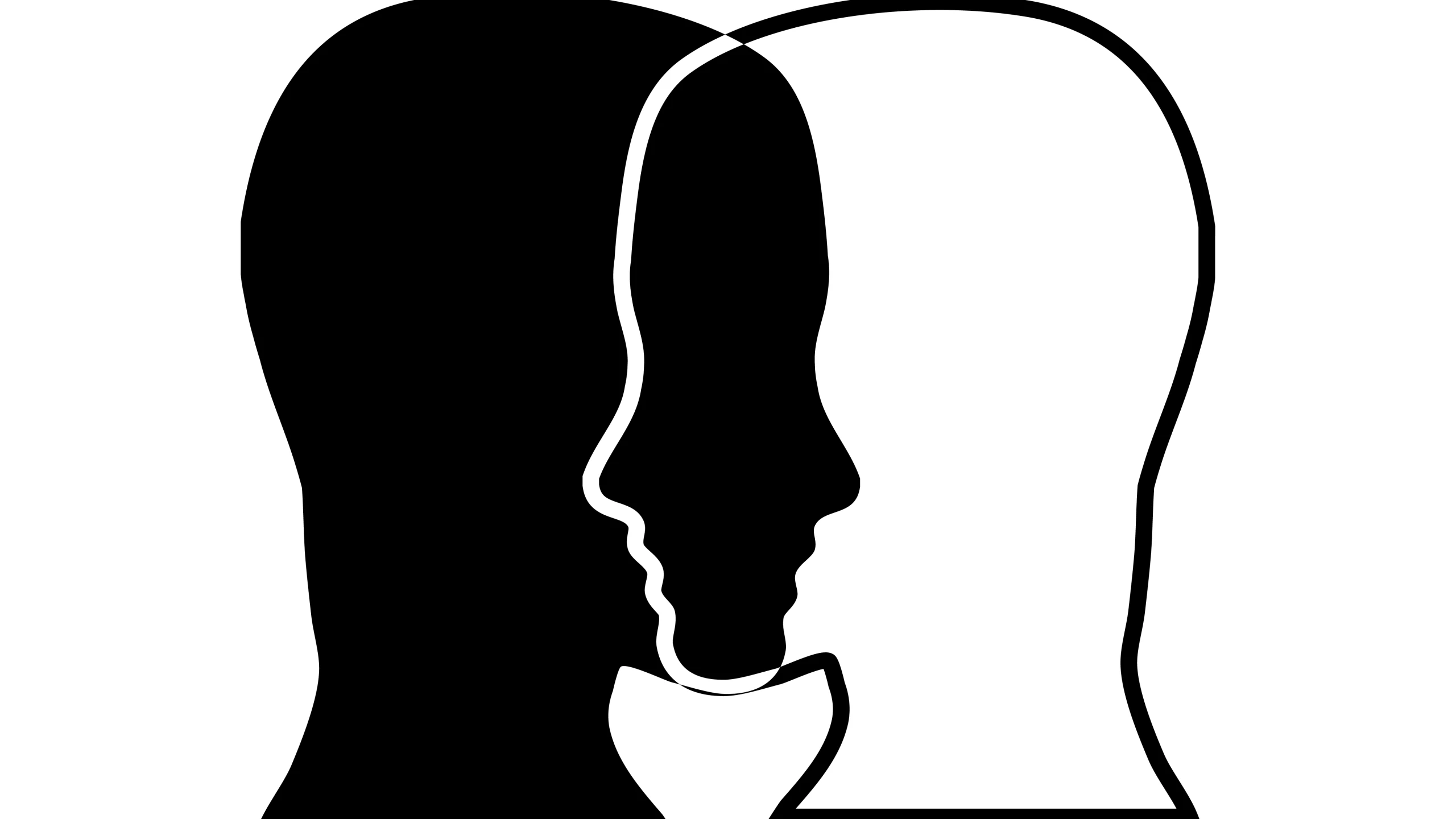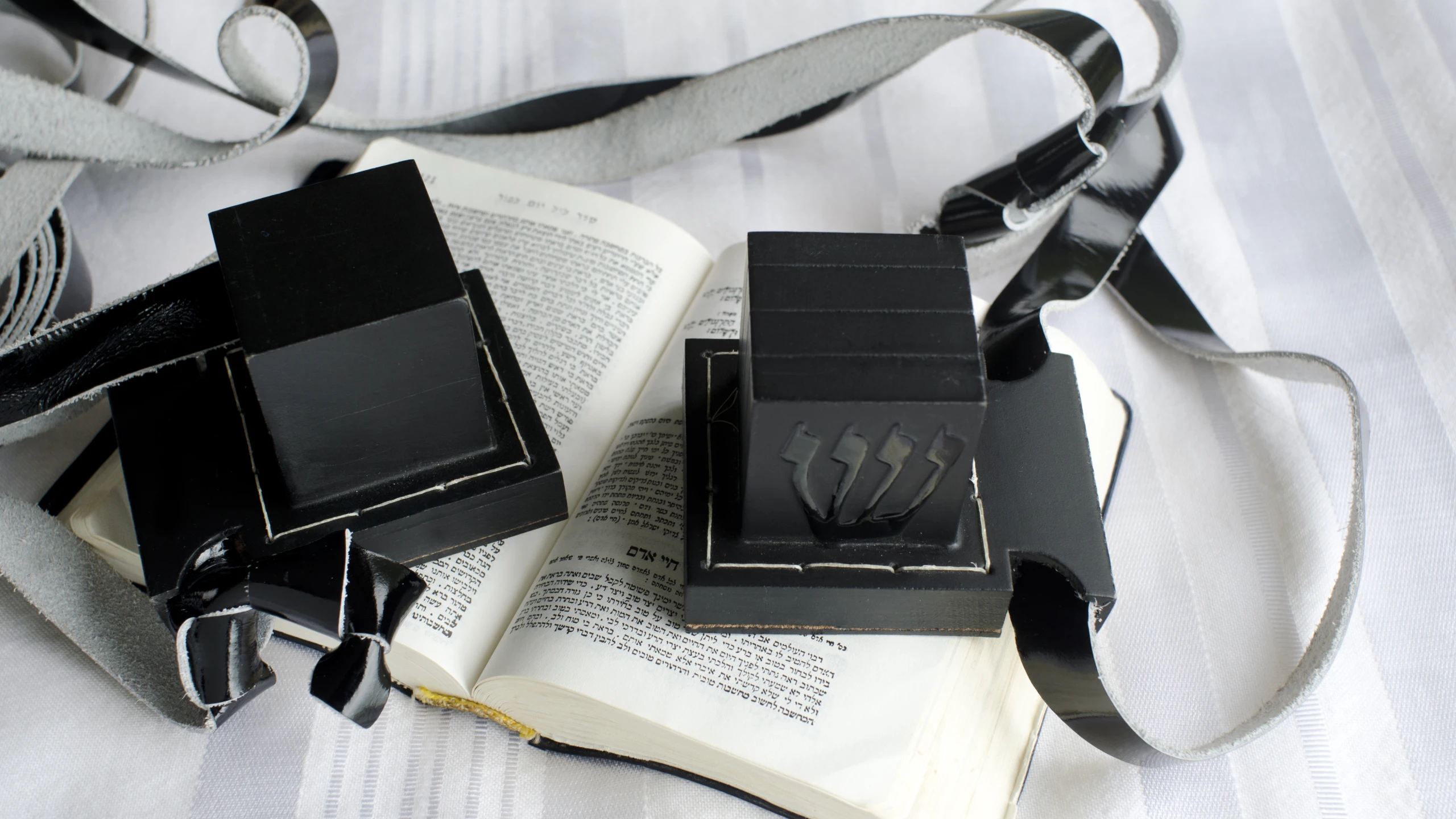Jacob's Three-Step Program toward Serenity
Tribute, Prayer and War
- December 7, 2011
- |
- 11 Kislev 5772
Rabbi YY Jacobson
2544 צפיות

Jacob's Three-Step Program toward Serenity
Tribute, Prayer and War
Rabbi YY Jacobson
- December 7, 2011
Two Perspectives
Sherlock Holmes and Dr. Watson go camping together, they put up a tent and go inside to enjoy a tranquil rest near the fire. In middle of the night, Sherlock turns to Dr. Watson and says, "So what are you thinking about now"?
Watson responds: "Sherlock! This is awesome. I'm gazing at the celestial stars hovering above us, I'm overwhelmed by the romantic splendor of the night, and I'm engulfed by the picturesque view of the Double Decker.
"And what are you thinking about"? asks Watson.
"That someone stole our tent," Sherlock replies.
Tribute, Prayer, and War
Following thirty-four years of separation from his parents, Jacob sets out with his family to return from Mesopotamia to his home in the Land of Israel. On his way, he learns that his brother Esau is advancing toward him with an imposing army of 400 troops.
the Torah relates in the opening of the portion of Vayishlach how Jacob prepares for his onfrontation with Esau through a three-pronged strategy of "tribute, prayer, and war[1]." Jacob first sent lavish gifts to Esau to assuage his wrath. These gifts included goats, ewes, camels, cows, bulls, and donkeys. Next, Jacob engaged in a heartfelt prayer, surrendering himself and his fate to G-d's compassion. Finally, Jacob readied himself and his family for war with Esau.
The Daily Battle
The stories in the Torah are not just events that occurred at a certain point in history, involving particular characters. They are also reflections of spiritual and emotional episodes that occur continuously in every human heart.
Man is a duality: He is a mountain of dust and a vision of G-d. The twin brothers Jacob and Esau embody, respectively, these polar forces within the human person[2]. Esau embodies our self-centered, egotistical, and animalistic identity, while Jacob personifies our transcendent, spiritual and idealistic soul.
The enmity and rivalry between the siblings reflect the tension and struggle between the two forces in our lives: the struggle between our ego and our humbleness, between our selfish cravings and our noble aspirations, and between our impulsive lusts and our altruistic yearnings.
None of us is exempt from this daily confrontation with "Esau." We constantly are overwhelmed with materialistic burdens, selfish moods, and immoral appetites. The incessant demands of our selfish and beastly consciousness present a threat to kill the "Jacob" within us.
How does one deal with these potent forces, which, seemingly, are much more powerful than the holy forces within us? We must employ Jacob's three-step program of tribute, prayer, and war.
Honoring Your Animal
First of all, we must grant Esau some of our assets. We have to acknowledge the animal consciousness living within us and honor its presence by granting it its needs. We must eat, sleep, exercise, earn a living and engage in an ongoing relationship with the physical world around us. The animal soul deserves to receive a lavish daily tribute from us, which includes our time, energy, and resources.
Yet, how do we ensure that we don't overdo it? How do we guarantee that our daily tributes to the animal identity within us will not place it at the center of our lives, supplanting the spiritual soul as the true core of our identity?
For this, Jacob must engage in prayer. "Rescue me," Jacob prays as Esau approaches, "from the hand of my brother, from the hand of Esau. I am afraid of him, for he may come and smite me[3]." Why the redundancy "from the hand of my brother, from the hand of Esau"?
There would be no need to fear Esau's influence if we were detached from the Esau reality; if we were to live as spiritual ascetics. Yet Judaism demands that Esau become our "brother;" that we engage our bodily and animal needs, and that we deal with the physical world around us. Under these conditions, the only way we can ensure that Esau does not dominate and control our lives is through prayer.
The Gift of Prayer
What is prayer? Just as there is a time to engage the animal soul and pay tribute to its needs and desires, there is a time each day when we let go of our physical identity and enter into the transcendental oasis of our soul. It is the time when we put the ego to sleep and we discover our inner love and spirituality.
All day, we think about our tents; during prayer, we focus on the stars, on the splendor and meaning of life.
Have you ever experienced the power of prayer? Sadly, most synagogues are more like cemeteries or chicken markets rather than spiritual islands where one may return home to his soul. That's a pity, because lacking the daily experience of genuine prayer we inevitably become vulnerable to the onslaught from the Esau within[4].
For example, when you don't pray, meditate and connect to your soul in the morning, you often lack the courage and vision to control the food addiction of the Esau-impulse and you engage in an unhealthy breakfast. When you go to the office, you may lack the fortitude to conduct your business affairs honestly. Prayer ensures that the tribute we present to our animal soul does not exhaust us completely till we have nothing left to call our own.
Under the Knife
Yet, all of the above does not suffice. Jacob must also prepare himself for war. Some of the urges and passions of our animal soul cannot be dealt with through prayer alone. We must declare war against them.
At times during the day or the night, we are overtaken by a powerful, animalistic Esau-like urge that is burning in our hearts like a baker's furnace. At such a moment there is only one thing to do: You must take your fist, punch the impulse in its face and get on with your life. War is a nasty thing, but at times it is our only hope to survive the onslaught of a demon that is determined to kill us[5].
A story:
One of the great Chassidic masters, Reb Simcah Bunam of Pshescah, once remarked that the true definition of a spiritual man is he who always imagines his head lying in a guillotine, his Yatzer Harah (unhealthy inclination) hovering above it, ready to chop off his head at a moment's call.
"But Rebbe," asked one of the Chassidim, "what if one does not have that feeling?"
"In that case," the Rebbe responded, "his head has been chopped off already[6]."
[1] Rashi, Genesis 32:9, quoting Midrash Tanchumah. [2] This is discussed in many of the mystical writings. [3] Genesis 32:12. [4] See Tanya chapters 12 and 28. [5] See Rashi to Talmud Berochos 5a. Tanya chapters 12, 27, 29. [6] This essay is based on the writings of Rabbi Schneur Zalman of Liadi, briefly transcribed in "LeTorah U'lmoadim" (by Rabbi Shlomo Yosef Zevin) p. 46.- תגובה
סיכום השיעור:
Two Perspectives
Sherlock Holmes and Dr. Watson go camping together, they put up a tent and go inside to enjoy a tranquil rest near the fire. In middle of the night, Sherlock turns to Dr. Watson and says, "So what are you thinking about now"?
Watson responds: "Sherlock! This is awesome. I'm gazing at the celestial stars hovering above us, I'm overwhelmed by the romantic splendor of the night, and I'm engulfed by the picturesque view of the Double Decker.
"And what are you thinking about"? asks Watson.
"That someone stole our tent," Sherlock replies.
Tribute, Prayer, and War
Following thirty-four years of separation from his parents, Jacob sets out with his family to return from Mesopotamia to his home in the Land of Israel. On his way, he learns that his brother Esau is advancing toward him with an imposing army of 400 troops.
the Torah relates in the opening of the portion of Vayishlach how Jacob prepares for his onfrontation with Esau through a three-pronged strategy of "tribute, prayer, and war[1]." Jacob first sent lavish gifts to Esau to assuage his wrath. These gifts included goats, ewes, camels, cows, bulls, and donkeys. Next, Jacob engaged in a heartfelt prayer, surrendering himself and his fate to G-d's compassion. Finally, Jacob readied himself and his family for war with Esau.
The Daily Battle
The stories in the Torah are not just events that occurred at a certain point in history, involving particular characters. They are also reflections of spiritual and emotional episodes that occur continuously in every human heart.
Man is a duality: He is a mountain of dust and a vision of G-d. The twin brothers Jacob and Esau embody, respectively, these polar forces within the human person[2]. Esau embodies our self-centered, egotistical, and animalistic identity, while Jacob personifies our transcendent, spiritual and idealistic soul.
The enmity and rivalry between the siblings reflect the tension and struggle between the two forces in our lives: the struggle between our ego and our humbleness, between our selfish cravings and our noble aspirations, and between our impulsive lusts and our altruistic yearnings.
None of us is exempt from this daily confrontation with "Esau." We constantly are overwhelmed with materialistic burdens, selfish moods, and immoral appetites. The incessant demands of our selfish and beastly consciousness present a threat to kill the "Jacob" within us.
How does one deal with these potent forces, which, seemingly, are much more powerful than the holy forces within us? We must employ Jacob's three-step program of tribute, prayer, and war.
Honoring Your Animal
First of all, we must grant Esau some of our assets. We have to acknowledge the animal consciousness living within us and honor its presence by granting it its needs. We must eat, sleep, exercise, earn a living and engage in an ongoing relationship with the physical world around us. The animal soul deserves to receive a lavish daily tribute from us, which includes our time, energy, and resources.
Yet, how do we ensure that we don't overdo it? How do we guarantee that our daily tributes to the animal identity within us will not place it at the center of our lives, supplanting the spiritual soul as the true core of our identity?
For this, Jacob must engage in prayer. "Rescue me," Jacob prays as Esau approaches, "from the hand of my brother, from the hand of Esau. I am afraid of him, for he may come and smite me[3]." Why the redundancy "from the hand of my brother, from the hand of Esau"?
There would be no need to fear Esau's influence if we were detached from the Esau reality; if we were to live as spiritual ascetics. Yet Judaism demands that Esau become our "brother;" that we engage our bodily and animal needs, and that we deal with the physical world around us. Under these conditions, the only way we can ensure that Esau does not dominate and control our lives is through prayer.
The Gift of Prayer
What is prayer? Just as there is a time to engage the animal soul and pay tribute to its needs and desires, there is a time each day when we let go of our physical identity and enter into the transcendental oasis of our soul. It is the time when we put the ego to sleep and we discover our inner love and spirituality.
All day, we think about our tents; during prayer, we focus on the stars, on the splendor and meaning of life.
Have you ever experienced the power of prayer? Sadly, most synagogues are more like cemeteries or chicken markets rather than spiritual islands where one may return home to his soul. That's a pity, because lacking the daily experience of genuine prayer we inevitably become vulnerable to the onslaught from the Esau within[4].
For example, when you don't pray, meditate and connect to your soul in the morning, you often lack the courage and vision to control the food addiction of the Esau-impulse and you engage in an unhealthy breakfast. When you go to the office, you may lack the fortitude to conduct your business affairs honestly. Prayer ensures that the tribute we present to our animal soul does not exhaust us completely till we have nothing left to call our own.
Under the Knife
Yet, all of the above does not suffice. Jacob must also prepare himself for war. Some of the urges and passions of our animal soul cannot be dealt with through prayer alone. We must declare war against them.
At times during the day or the night, we are overtaken by a powerful, animalistic Esau-like urge that is burning in our hearts like a baker's furnace. At such a moment there is only one thing to do: You must take your fist, punch the impulse in its face and get on with your life. War is a nasty thing, but at times it is our only hope to survive the onslaught of a demon that is determined to kill us[5].
A story:
One of the great Chassidic masters, Reb Simcah Bunam of Pshescah, once remarked that the true definition of a spiritual man is he who always imagines his head lying in a guillotine, his Yatzer Harah (unhealthy inclination) hovering above it, ready to chop off his head at a moment's call.
"But Rebbe," asked one of the Chassidim, "what if one does not have that feeling?"
"In that case," the Rebbe responded, "his head has been chopped off already[6]."
[1] Rashi, Genesis 32:9, quoting Midrash Tanchumah. [2] This is discussed in many of the mystical writings. [3] Genesis 32:12. [4] See Tanya chapters 12 and 28. [5] See Rashi to Talmud Berochos 5a. Tanya chapters 12, 27, 29. [6] This essay is based on the writings of Rabbi Schneur Zalman of Liadi, briefly transcribed in "LeTorah U'lmoadim" (by Rabbi Shlomo Yosef Zevin) p. 46.
תגים
קטגוריות
Essay Vayishlach
Rabbi YY Jacobson
- December 7, 2011
- |
- 11 Kislev 5772
- |
- 2544 צפיות

Jacob's Three-Step Program toward Serenity
Tribute, Prayer and War
Rabbi YY Jacobson
- December 7, 2011
Two Perspectives
Sherlock Holmes and Dr. Watson go camping together, they put up a tent and go inside to enjoy a tranquil rest near the fire. In middle of the night, Sherlock turns to Dr. Watson and says, "So what are you thinking about now"?
Watson responds: "Sherlock! This is awesome. I'm gazing at the celestial stars hovering above us, I'm overwhelmed by the romantic splendor of the night, and I'm engulfed by the picturesque view of the Double Decker.
"And what are you thinking about"? asks Watson.
"That someone stole our tent," Sherlock replies.
Tribute, Prayer, and War
Following thirty-four years of separation from his parents, Jacob sets out with his family to return from Mesopotamia to his home in the Land of Israel. On his way, he learns that his brother Esau is advancing toward him with an imposing army of 400 troops.
the Torah relates in the opening of the portion of Vayishlach how Jacob prepares for his onfrontation with Esau through a three-pronged strategy of "tribute, prayer, and war[1]." Jacob first sent lavish gifts to Esau to assuage his wrath. These gifts included goats, ewes, camels, cows, bulls, and donkeys. Next, Jacob engaged in a heartfelt prayer, surrendering himself and his fate to G-d's compassion. Finally, Jacob readied himself and his family for war with Esau.
The Daily Battle
The stories in the Torah are not just events that occurred at a certain point in history, involving particular characters. They are also reflections of spiritual and emotional episodes that occur continuously in every human heart.
Man is a duality: He is a mountain of dust and a vision of G-d. The twin brothers Jacob and Esau embody, respectively, these polar forces within the human person[2]. Esau embodies our self-centered, egotistical, and animalistic identity, while Jacob personifies our transcendent, spiritual and idealistic soul.
The enmity and rivalry between the siblings reflect the tension and struggle between the two forces in our lives: the struggle between our ego and our humbleness, between our selfish cravings and our noble aspirations, and between our impulsive lusts and our altruistic yearnings.
None of us is exempt from this daily confrontation with "Esau." We constantly are overwhelmed with materialistic burdens, selfish moods, and immoral appetites. The incessant demands of our selfish and beastly consciousness present a threat to kill the "Jacob" within us.
How does one deal with these potent forces, which, seemingly, are much more powerful than the holy forces within us? We must employ Jacob's three-step program of tribute, prayer, and war.
Honoring Your Animal
First of all, we must grant Esau some of our assets. We have to acknowledge the animal consciousness living within us and honor its presence by granting it its needs. We must eat, sleep, exercise, earn a living and engage in an ongoing relationship with the physical world around us. The animal soul deserves to receive a lavish daily tribute from us, which includes our time, energy, and resources.
Yet, how do we ensure that we don't overdo it? How do we guarantee that our daily tributes to the animal identity within us will not place it at the center of our lives, supplanting the spiritual soul as the true core of our identity?
For this, Jacob must engage in prayer. "Rescue me," Jacob prays as Esau approaches, "from the hand of my brother, from the hand of Esau. I am afraid of him, for he may come and smite me[3]." Why the redundancy "from the hand of my brother, from the hand of Esau"?
There would be no need to fear Esau's influence if we were detached from the Esau reality; if we were to live as spiritual ascetics. Yet Judaism demands that Esau become our "brother;" that we engage our bodily and animal needs, and that we deal with the physical world around us. Under these conditions, the only way we can ensure that Esau does not dominate and control our lives is through prayer.
The Gift of Prayer
What is prayer? Just as there is a time to engage the animal soul and pay tribute to its needs and desires, there is a time each day when we let go of our physical identity and enter into the transcendental oasis of our soul. It is the time when we put the ego to sleep and we discover our inner love and spirituality.
All day, we think about our tents; during prayer, we focus on the stars, on the splendor and meaning of life.
Have you ever experienced the power of prayer? Sadly, most synagogues are more like cemeteries or chicken markets rather than spiritual islands where one may return home to his soul. That's a pity, because lacking the daily experience of genuine prayer we inevitably become vulnerable to the onslaught from the Esau within[4].
For example, when you don't pray, meditate and connect to your soul in the morning, you often lack the courage and vision to control the food addiction of the Esau-impulse and you engage in an unhealthy breakfast. When you go to the office, you may lack the fortitude to conduct your business affairs honestly. Prayer ensures that the tribute we present to our animal soul does not exhaust us completely till we have nothing left to call our own.
Under the Knife
Yet, all of the above does not suffice. Jacob must also prepare himself for war. Some of the urges and passions of our animal soul cannot be dealt with through prayer alone. We must declare war against them.
At times during the day or the night, we are overtaken by a powerful, animalistic Esau-like urge that is burning in our hearts like a baker's furnace. At such a moment there is only one thing to do: You must take your fist, punch the impulse in its face and get on with your life. War is a nasty thing, but at times it is our only hope to survive the onslaught of a demon that is determined to kill us[5].
A story:
One of the great Chassidic masters, Reb Simcah Bunam of Pshescah, once remarked that the true definition of a spiritual man is he who always imagines his head lying in a guillotine, his Yatzer Harah (unhealthy inclination) hovering above it, ready to chop off his head at a moment's call.
"But Rebbe," asked one of the Chassidim, "what if one does not have that feeling?"
"In that case," the Rebbe responded, "his head has been chopped off already[6]."
[1] Rashi, Genesis 32:9, quoting Midrash Tanchumah. [2] This is discussed in many of the mystical writings. [3] Genesis 32:12. [4] See Tanya chapters 12 and 28. [5] See Rashi to Talmud Berochos 5a. Tanya chapters 12, 27, 29. [6] This essay is based on the writings of Rabbi Schneur Zalman of Liadi, briefly transcribed in "LeTorah U'lmoadim" (by Rabbi Shlomo Yosef Zevin) p. 46.- תגובה
סיכום השיעור:
שיעורים קשורים
אנא עזרו לנו להמשיך בפעילותנו
הרשמה לקבלת תוכן (באנגלית) עדכני מאת הרב יוסף יצחק ג'ייקובסון
צרפו חברים ומשפחה לקבוצת הווסטאפ שלנו
צרפו חברים ומשפחה לקבוצת הווסטאפ שלנו















אנא השאירו את תגובתכם למטה!